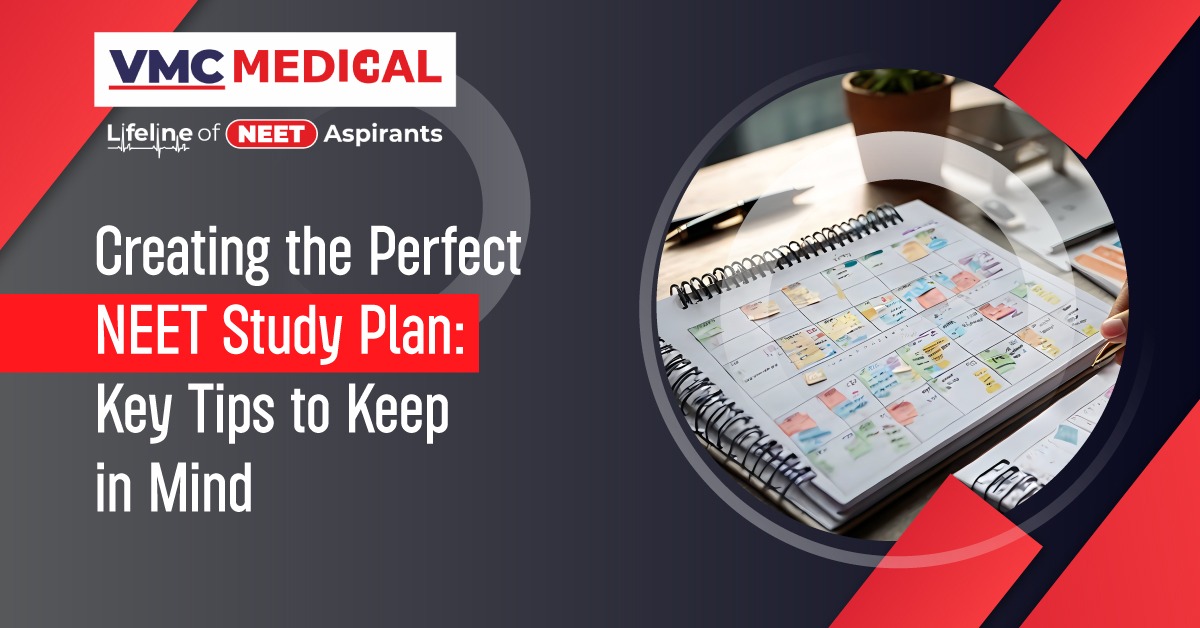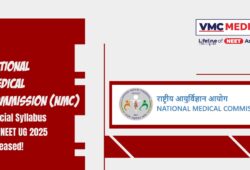Creating the Perfect NEET Study Plan: Key Tips to Keep in Mind
 Posted On
Posted On
138 total views, 3 views today
Preparing for NEET (National Eligibility cum Entrance Test) is no easy task. It requires rigorous dedication, strategic planning, and a methodical approach to ensure that you are not just studying, but studying effectively. A well-structured study plan can help ease the overwhelming pressure and increase your chances of acing the exam. In this blog, we’ll explore essential tips that you should keep in mind while preparing your NEET study plan to optimize your success.
1. Analyze the NEET Syllabus Thoroughly
The NEET syllabus is vast, covering concepts from both Class 11 and 12. To avoid feeling lost or overwhelmed, it’s essential to familiarize yourself with the entire syllabus before you even start. Break the syllabus down into smaller, manageable sections based on subjects—Physics, Chemistry, and Biology—and the chapters within them.
Tip: Highlight the topics that carry more weight and prioritize those areas without neglecting other portions.
Key Points:
- Physics: Focus on mechanics, thermodynamics, and electricity & magnetism.
- Chemistry: Study organic chemistry reactions, physical chemistry concepts, and periodic table trends.
- Biology: Concentrate on genetics, evolution, human physiology, and plant biology.
2. Create a Realistic Timetable
Your study plan should revolve around a realistic timetable, one that suits your pace and daily routine. Organize your study hours in a way that maximizes efficiency but also allows room for relaxation and breaks.
Tip: Avoid studying the same subject for long stretches; mix up subjects to maintain interest and engagement. For example, you can follow a pattern where you study Biology for two hours, then switch to Chemistry, followed by Physics.
Key Points:
- Allocate more time to difficult or high-weightage topics.
- Include regular breaks (use the Pomodoro technique—25 minutes of study, 5-minute breaks).
- Keep a balance between revision, mock tests, and new learning.
3. Use the Right Study Materials
The importance of selecting the right study material cannot be overstated. Begin by referring to NCERT textbooks, as they are considered the backbone for NEET preparation. Once you’ve built a strong foundation, you can supplement with reference books like HC Verma for Physics, OP Tandon for Chemistry, and Trueman’s Biology.
Tip: Don’t overwhelm yourself with too many reference books. Stick to a few trusted resources and thoroughly understand their content.
Key Points:
- Start with NCERTs and understand each concept well.
- Refer to specific guides for tricky topics or higher-level problems.
- Solve past NEET papers to familiarize yourself with the question format.
4. Prioritize Time Management During Studies
Effective time management is one of the most important aspects of a successful NEET study plan. You need to understand how much time to allocate to each topic and when to revise previously covered material.
Tip: Use a daily and weekly planner to track your progress. Identify the subjects or topics where you tend to lag and adjust your study time accordingly.
Key Points:
- Allocate extra time to your weaker areas.
- Stick to deadlines for completing specific portions of the syllabus.
- Divide your preparation into learning, revision, and test-taking phases.
5. Practice Mock Tests and Previous Year Papers
Practicing previous year’s NEET papers and taking regular mock tests are crucial steps in your preparation. These help you simulate the actual exam environment, improve your speed, and give you a feel for the type of questions you’ll encounter.
Tip: After each mock test, review your performance. Identify the areas where you made mistakes and work on improving those.
Key Points:
- Start taking mock tests once you have covered at least 70% of the syllabus.
- Analyze every test to understand your strengths and weaknesses.
- Focus on improving time management and question-solving accuracy.
6. Focus on Conceptual Clarity
NEET is not just about rote learning; it tests your understanding of fundamental concepts. Be sure to clarify each concept thoroughly before moving on to advanced problems. If there’s something you don’t understand, take the time to revisit it and ensure that you have a strong grip.
Tip: Use visual aids like diagrams, charts, and mind maps to break down complex topics into simpler parts.
Key Points:
- Use concept maps for Biology and flowcharts for Chemistry.
- In Physics, emphasize solving problems to grasp the practical applications of formulas.
- Understand the “why” behind every concept rather than just memorizing it.
7. Maintain a Balanced Routine
Maintaining a balance between your studies and your well-being is essential. Overworking yourself without breaks can lead to burnout and reduced productivity. Ensure that you maintain a healthy balance between studying, eating well, exercising, and resting.
Tip: Incorporate activities like yoga, meditation, or light physical exercise into your daily routine to stay fresh and focused.
Key Points:
- Get at least 7-8 hours of sleep every night.
- Take short breaks during study sessions to avoid mental fatigue.
- Eat nutritious food that boosts brain function and energy.
8. Regular Revision is Crucial
Regular revision is key to retaining the massive volume of information you’ll cover. Create a weekly revision plan that covers the topics you’ve already studied to ensure that they stay fresh in your mind.
Tip: Make quick notes and flashcards while studying to help you revise efficiently. Use them for a quick review a day or two before your tests.
Key Points:
- Revise difficult topics at least once a week.
- Use flashcards for Biology definitions and key terms.
- In Chemistry, focus on formulae and reaction mechanisms during revision.
9. Stay Positive and Motivated
Lastly, a positive mindset is crucial when preparing for an exam as challenging as NEET. It’s easy to get demotivated during the journey, but staying focused on your goal and keeping yourself motivated can make a world of difference.
Tip: Surround yourself with positivity—whether that’s through motivational quotes, supportive friends and family, or visualizing your success.
Key Points:
- Take breaks to pursue hobbies that refresh your mind.
- Keep reminding yourself of your long-term goals.
- Celebrate small achievements along the way.
Closing Thoughts
A well-rounded NEET study plan is built on careful time management, consistent practice, and smart revision. Stick to these tips while crafting your plan, and you’ll find yourself in a stronger position to tackle the NEET exam confidently. Remember, it’s not just about hard work, but also about working smart. Stay focused, take care of your health, and stay consistent—success will follow!




